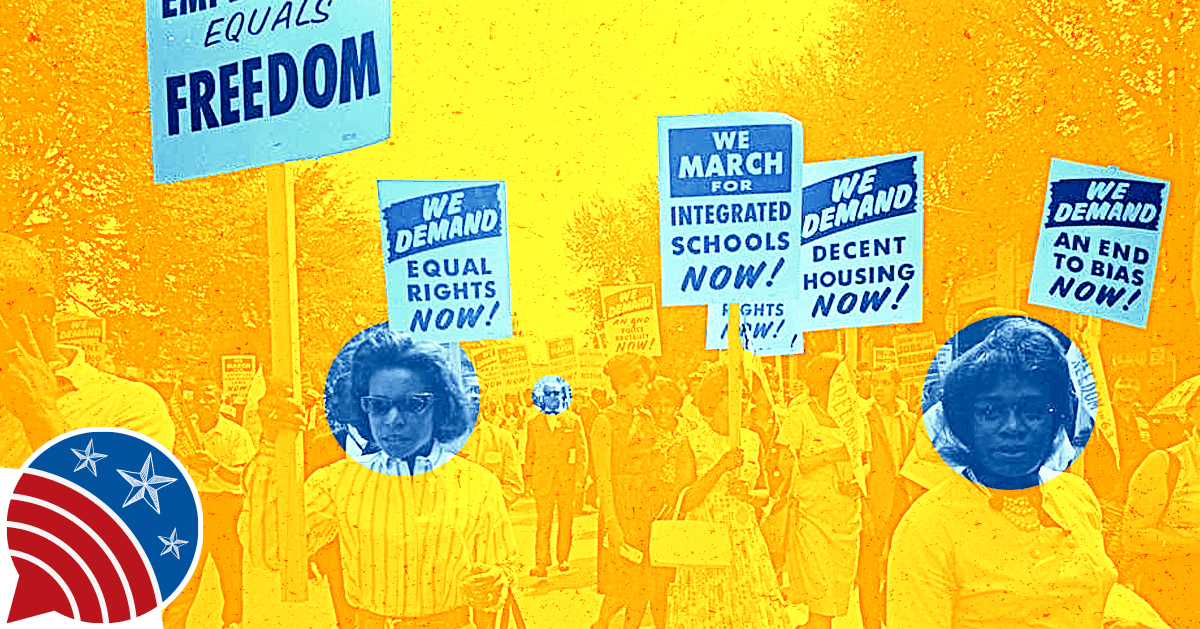
Civil Rights
Since its founding, the Constitution has been used, challenged, and made more perfect. All of this has been done to secure civil rights for groups whose rights have not always been protected. Explore the history of civil rights in America from its founding to today. How did Reconstruction amendments, civil rights legislation, and court cases like Brown v. the Board of Education shape the evolution of American civil rights? What issues still remain today? Prepare to engage in discourse on our country’s history with civil rights and what that means today and in the future.
Podcasts & Videos
The Reconstruction Amendments: Civil Rights, Part 3
Instructions
- Watch and listen to the 60-Second Civics video below. If you'd like, you can also read along using the script that appears below the quiz. Or you can turn on the video's subtitles and read while watching the video.
- Take the Daily Civics Quiz. If you get the question wrong, watch the video again or read the script and try again.
Episode Description
Dr. Donna Phillips: Welcome to 60-Second Civics, the daily podcast of the Center for Civic Education. I'm Donna Phillips. Today we continue our series on civil rights as part of our Civil Discourse: An American Legacy project. We're joined again today by Dr. Lester Brooks, American history professor emeritus from Anne Arundel Community College. Welcome back, Dr. Brooks.
Dr. Lester Brooks: Thank you for having me.
Dr. Donna Phillips: Absolutely. Dr. Brooks, how did the Reconstruction Amendments set the stage for the ongoing battle for the civil rights?
Dr. Lester Brooks: The Reconstruction era was an incredible period. We had just finished the Civil War, and now we get this 12-year period of trying to bind the nation back together. So we get three important amendments. The 13th Amendment, which abolished the institution of slavery, the 14th Amendment, which at the time was referenced as the Citizenship Amendment, and the 15th Amendment that spoke of voting rights.
And these three amendments will change the nation forever. First of all, the status of Blacks, which changed forever because the institution of slavery is abolished. The 14th Amendment talks about the idea of citizenship and also it will talk about the equal protection of the laws. And then the 15th Amendment. Of course, a key thing, voting rights are for the freedmen, and that too, will begin to expand.
And we'll see particularly the 14th Amendment and the 15th Amendment in the 20th century be a focal point.
Dr. Donna Phillips: Thank you, Dr. Brooks. That's all for today's podcast. 60-Second Civics, where civics only takes a minute.
Dr. Lester Brooks: Thank you for having me.
Dr. Donna Phillips: Absolutely. Dr. Brooks, how did the Reconstruction Amendments set the stage for the ongoing battle for the civil rights?
Dr. Lester Brooks: The Reconstruction era was an incredible period. We had just finished the Civil War, and now we get this 12-year period of trying to bind the nation back together. So we get three important amendments. The 13th Amendment, which abolished the institution of slavery, the 14th Amendment, which at the time was referenced as the Citizenship Amendment, and the 15th Amendment that spoke of voting rights.
And these three amendments will change the nation forever. First of all, the status of Blacks, which changed forever because the institution of slavery is abolished. The 14th Amendment talks about the idea of citizenship and also it will talk about the equal protection of the laws. And then the 15th Amendment. Of course, a key thing, voting rights are for the freedmen, and that too, will begin to expand.
And we'll see particularly the 14th Amendment and the 15th Amendment in the 20th century be a focal point.
Dr. Donna Phillips: Thank you, Dr. Brooks. That's all for today's podcast. 60-Second Civics, where civics only takes a minute.







